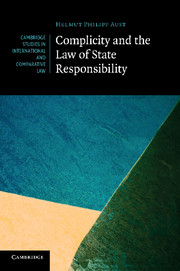Book contents
- Frontmatter
- Contents
- Foreword
- Preface
- Table of cases
- Abbreviations
- 1 Introduction
- 2 Complicity between bilateralism and community interest
- 3 Complicity and the international rule of law
- 4 Complicity in customary international law
- 5 The concept of complicity in Article 16 ASR
- 6 The consequences of complicity
- 7 Complicity and aggravated responsibility
- 8 A network of rules on complicity
- General conclusions
- Bibliography
- Index
4 - Complicity in customary international law
Published online by Cambridge University Press: 07 September 2011
- Frontmatter
- Contents
- Foreword
- Preface
- Table of cases
- Abbreviations
- 1 Introduction
- 2 Complicity between bilateralism and community interest
- 3 Complicity and the international rule of law
- 4 Complicity in customary international law
- 5 The concept of complicity in Article 16 ASR
- 6 The consequences of complicity
- 7 Complicity and aggravated responsibility
- 8 A network of rules on complicity
- General conclusions
- Bibliography
- Index
Summary
In the previous chapter, we saw that there is a strong presumption for the existence of rules on complicity in international law. This presumption is based on systematic considerations, i.e., the situation of conflict of rights which would otherwise ensue. If the international legal system aspires to material completeness, it can thus be expected that rules will have come into existence that would remedy this conflictual situation. At the same time, we have held that, although the concept of an international rule of law speaks in favour of this line of reasoning, it cannot be expected that concrete rules can be deduced from these considerations. Rather, an assessment of international practice will have to show whether customary rules on the matter exist. It goes without saying that the work of the ILC in the field of State responsibility cannot but strengthen the presumption we have already expressed. Hence, there is a great likelihood that Article 16 ASR will be an adequate expression of the customary international law on the matter. However, it is not advisable to accept this finding without question: the ILC is not beyond reproach and, as we will see, especially with respect to Article 16 ASR there exist good reasons to enquire into the basis of this provision in customary international law.
In its final commentaries to the ASR, the ILC appears to uphold the customary character of Article 16 ASR. Although the Commentary does not mention this directly, it can be inferred from formulations such as ‘State practice supports assigning international responsibility to a State which deliberately participates in the internationally wrongful conduct of another through the provision of aid or assistance’ or ‘[i]n any event, wrongful assistance given to another State has frequently led to diplomatic protests. States are entitled to assert complicity in the wrongful conduct of another State.’ This confirmation of the character of Article 16 ASR as a rule of customary international law stands in marked contrast to what Special Rapporteur Roberto Ago still held when he presented his initial Draft Article on complicity, namely, that the provision would be part of the progressive development of international law, and also to remarks of Special Rapporteur James Crawford after the completion of the Draft Articles. Academic writings on this question are divided: while the vast majority of authors hold that Article 16 ASR represents customary international law,others discuss this issue, while some are outrightly sceptical in this regard.
- Type
- Chapter
- Information
- Complicity and the Law of State Responsibility , pp. 97 - 191Publisher: Cambridge University PressPrint publication year: 2011

